Marder to guide Obama initiative
President Obama's new science initiative, Brain Research through Advancing Innovative Neurotechnologies, will have a Brandeis touch as Prof. Eve Marder (BIOL) has been named to the advisory board of the initiative, according to an April 5 BrandeisNOW press release. She will join 13 other scientists who will form the "brain trust" to direct the project.
"This is an extremely exciting time for neuroscience research," wrote Marder in an email to the Justice. "The new initiative is to foster development of technological innovation in support of understanding how the brain works."
"I was pleased to be included in the delegation to the White House in support of the BRAIN initiative," she continued in her email.
The initiative will research all levels of brain function, ranging from individual neurons to entire circuits, according to the press release. One of the goals of the initiative is to "provide insight into devastating diseases like Parkinson's, Alzheimer's, and autism."
The initial goal of the advisory board will be securing funding for the project to go forward. "As a member of the 14-person BRAIN working group for the [National Institutes of Health], I will be part of intensive discussions that will start very soon and will be designed [to] formulate some of the implementation of the funding plans for the NIH's part in the initiative," wrote Marder in her email.
According to the press release, President Obama is planning to ask major scientific institutions such as the NIH, the Defense Advanced Research Projects Agency and the National Science Foundation for help with funding for the project.
Brandeis is the smallest research university represented on the advisory board, according to the press release, joining Stanford University, Harvard University, Brown University, Princeton University and the California Institute of Technology.
Marder, who has been a member of the Brandeis faculty since 1978, has a distinguished professional history, picking up numerous awards, prizes and recognitions, including the 2012 George A. Miller Prize in Cognitive Neuroscience and the 2012 Karl Spencer Lashley Award. She is also a Massachusetts Academy of Sciences Fellow. In the press release, Marder expressed unwavering enthusiasm about the potential of the project.
"We're at a very interesting and exciting moment in neuroscience research right now because the technological innovations of the last decade have completely transformed the kinds of experiments we can do today," said Marder. "We couldn't even dream of these experiments 15 years ago."
"Do I think new technologies will drive exciting new experiments?" she continued. "Absolutely. Will there be completely unanticipated breakthroughs in health? Absolutely."



Please note All comments are eligible for publication in The Justice.